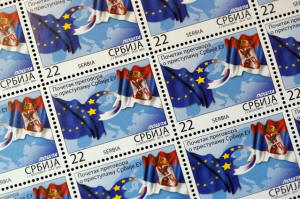|
Balkans fear Brexit will delay EU dream
 Send a link to a friend
Send a link to a friend
 [June 28, 2016]
By Giles Elgood [June 28, 2016]
By Giles Elgood
BELGRADE (Reuters) - Balkan countries
hoping to join the European Union fear their journey to membership of a
club they see as offering prosperity and stability will face delays and
uncertainty now that Britain has voted to leave.
Albania, Bosnia, Kosovo, Macedonia, Montenegro and Serbia, which
endured war and upheaval in the 1990s, are all at different stages
in joining the 28-nation EU.
The immediate reaction in Balkan capitals to Britain's referendum
decision last Thursday was that EU membership efforts would continue
undiminished.
Prime Minister Aleksandar Vucic said Serbia would stick to its
"European path", aiming to complete accession talks by 2019.
Bosnia should not be discouraged by the British vote and must press
on with EU integration, said Denis Zvizdic, chairman of Bosnia's
council of ministers.
But there is now acceptance that the Brexit upheaval, which came
with the EU already showing less enthusiasm about enlargement, is
likely to delay accession for the Balkan hopefuls. Some felt they
had lost a champion in London.
 "Our fear is that following Brexit the enlargement process could be
slowed down," said Maja Bobic, secretary-general of the European
Movement in Serbia, a group that promotes EU values.
She said that as the EU negotiates Britain's departure, Brussels
will be focused on how the bloc can be consolidated rather than
enlarged.
DIFFICULTIES EMERGE
Difficulties for Serbia emerged as early as Monday when it failed to
gain the support it needed from Britain for the next stage in
accession negotiations. Serbian officials said technical reasons
related to Brexit were the cause.
Bosnian Serb Prime Minister Zeljka Cvijanovic said aspiring members
must accept that joining the EU will be delayed by Brexit "because
it will take several years for the EU to consolidate and carry out
the reforms it should have done years ago to prevent such things
from happening".
Analyst Igor Gavran said Bosnia could expect political fallout from
Brexit "because Britain was one of the countries that most openly
supported the integration of Bosnia into the EU".
[to top of second column] |

Special edition postage stamps show Serbia and EU flags, in Belgrade
January 21, 2014. REUTERS/Marko Djurica/File Photo

In Kosovo, European Integration Minister Bekim Collaku said that his
country, which seceded from Serbia in 2008, had also lost a strong
supporter of its EU bid.
"We know the big contribution Great Britain made towards building
Kosovo's statehood and it will be difficult for another country to
fill this vacuum," he told local media.
An Albanian official said his country had learnt that big crises
such as the migrant issue, the euro and Greece distracted EU leaders
from paying attention to the Balkans.
Montenegro's EU negotiator, Andrija Pejovic, was optimistic that
membership negotiations could move forward as planned, but
acknowledged matters were unclear.
"In the coming days we will see what position the EU bodies will
take regarding this issue," he said.
For Macedonia, nothing has changed post-Brexit. Its EU bid remains
blocked by a dispute with Greece over its name, which Athens says
should belong only to its own province of Macedonia.
(Reporting by Ivana Sekularac, Benet Koleka, Fatos Bytyci, Petar
Komnenic, Kole Casule and Maja Zuvela; Editing by Richard Balmforth)
[© 2016 Thomson Reuters. All rights
reserved.]
Copyright 2016 Reuters. All rights reserved. This material may not be published,
broadcast, rewritten or redistributed.
 |